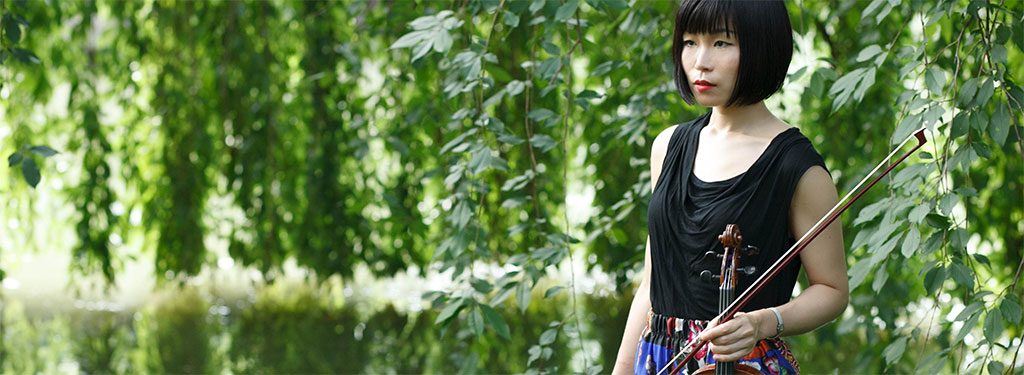
Tomoko Omura, originally from Shizuoka, Japan, began studying violin at a young age under the tutelage of her mother. She then moved on to jazz while studying at Yokohama National University before attending the Berklee College of Music, in 2004, where she was given a scholarship. In 2005, during her sophomore year, she was awarded Berklee’s prestigious Roy Haynes award; an award given to one student for their exceptional improvisational skills. Tomoko was the first violinist in Berklee’s history to receive this award. She graduated summa cum laude in 2007 and she’s lived in Brooklyn, New York, since 2010, playing with Fabian Almazan, Paquito D’Rivera, The Mahavishnu Project, and many more.
Roots, her debut album for Inner Circle, is a compelling tribute to her native Japan, featuring original arrangements of ten classic Japanese folk and popular songs. In the words of fellow violinist Christian Howes, “Roots is a tremendous accomplishment, and undoubtedly one of the most important and creative jazz albums produced by a violinist in recent history.”
To be honest, I was reticent at first about this one since I am not particularly fond of jazz violin and the modern interpretation of traditional Japanese standards worried me. But Anthony played a few tracks on his radio show the Line-Up so I decided to give it a listen and turns out I was dead wrong about this one.
The album features a very modern and sturdy line-up with Will Graefe on guitar, Nextbop favorites Glenn Zaleski and Colin Stranahan respectively on piano and drums, as well as Noah Garabedian on bass.
Roots kicks off with “Antagata Dokosa (Where Are You From?)” where the melody is sung in Japanese before the band comes in. Even though the song seems kitsch at first it progresses into a convincing piece with a stunning solo by Omura.
Next comes “Gegege”, which has an enticing intro by Omura picking away at the chords of her violin before Graefe picks up the riff on his guitar giving the song a more rock feel.
“Kojo no Tsuki (Castle In The Moonlight)” is one of my favorites from the album as a short bass intro leads into an enticing piano riff by Zaleski, reminiscent of a young Shai Maestro playing in Avishai Cohen’s trio, while Omura plays the subdued melody on violin. Zaleski then goes on to build on the riff to create a spectacular solo. Omura is next and stretching her notes to the fullest she accomplishes a truly majestic feel.
“Tinsagu nu Hana (Balsam Flowers)” features a long and winding solo intro by Omura leaning on the melancholic side. The melody is calm and peaceful and played with real finesse but the song then picks up in pace propelled by the drums on Stranahan. Solos are then taken by Garabedian, Zaleski and Omura before the song reaches its climax, a powerful violin solo with effects by Omura.
“Green Tea Picking” as a clever intro with Omura gently picking at her violin over the sounds of tea being prepared before the whole band jumps in at a rapid pace with a more traditional jazz feel.
“The Mountain” is a beautifully lyrical and soothing ballad where Zaleski gives us a brilliant performance on piano over the complex drumming of Stranahan followed by an equally intricate and harmonious solo by Omura.
“Soran Song” is another one of my favorites off this record. It kicks off with an animated violin riff over the thunderous drums of Stranahan before Zaleski comes in with a short piano intro. The light and airy melody is played by Omura and Graefe which then both go on to solo competently.
“Shizuoka Song”, also another one of my favorites, is the longest piece of the album which begins with Omura and Graefe picking away at their instruments before moving on to the pensive melody. A long and winding solo by Omura is then taken in which she displays her mastery of the violin in full. Zaleski is next with a lovely and developed piano solo before trades between Garabedian and Stranahan proceed. The piece closes out with a short and refined solo by Graefe.
The album ends with “Hometown”, an unhurried and emotional ballad where the juxtaposition of the different band member’s playing creates real synergy.
Roots is overall a brilliant album which I will definitely keep playing again and again. Omura masterfully injects her bold and contemporary blend of jazz into these Japanese standards to create a new and refreshing sound she can proudly call her own. The album’s line-up is stellar between Zaleski, Stranahan, Garabedian and the very modern sound of Graefe. Turns out 2015 is gearing up to be a great year for jazz. Between this album, Marc Cary’s Rhodes Ahead Vol. 2 and Aidan Carroll’s Original Vision, as well as the plethora of new releases coming up, it’s going to be difficult to decide this year’s “Best Albums”.
